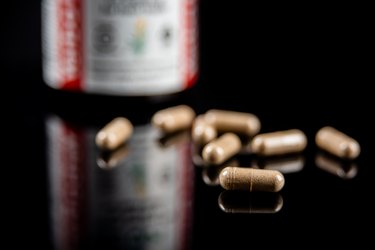
Cinnamon has long been a staple of traditional medicine — and its use as a spice stretches back thousands of years, according to the National Center for Complementary and Integrative Health (NCCIH).
But despite its popularity, researchers are still learning about the benefits of cinnamon — including whether taking cinnamon pills can boost your health and how.
Video of the Day
Video of the Day
What Is Cinnamon?
Cinnamon comes from the bark of the cinnamon tree, according to the NCCIH. The most common type of cinnamon sold in the United States is cassia cinnamon, which is native to China. Another type of cinnamon, called ceylon cinnamon, is found in Sri Lanka, and is sometimes referred to as "true" cinnamon.
Today, cinnamon can be packaged as a spice, supplement or tea; cinnamon pills and cinnamon supplements are used by people who want to lose weight, regulate their blood sugar levels and gain other health benefits.
Cinnamon is composed of the compounds cinnamic acid, cinnamaldehyde, eugenol and coumarin — all of which have antimicrobial (microbe-killing) abilities, according to a research review published in February 2019 in the journal Clinical Nutrition. The researchers also note that cinnamon is rich in antioxidants like polyphenols, which could help ward off diseases like cancer.
Read more: The Benefits of Cinnamon Tea
Benefits of Cinnamon Pills
It's possible that taking cinnamon supplements could help you lose weight. In the February 2019 Clinical Nutrition review, researchers examined 12 studies and concluded that taking at least 2 grams of cinnamon pills for 12 weeks or more could significantly reduce fat mass. The review also showed that taking cinnamon pills could help reduce people's waist circumferences and weights, particularly in those with a BMI over 30.
Another research review, published in the November-December 2017 issue of the Journal of Clinical Lipidology, found that people who took cinnamon supplements lowered their triglyceride and total cholesterol levels.
Other research shows that cinnamon supplements can help people improve their blood sugar levels and better control their diabetes. For example, a study published in June 2016 in the journal Diabetology International found that when people with type 2 diabetes took cinnamon pills for 60 days, they saw a drop in their blood sugar and A1C levels. Another study, published in April 2019 in the journal Clinical Nutrition, found that cinnamon pills could help people with diabetes control their blood sugar levels, especially those with higher BMIs.
While these studies seem promising, the NCCIH points out that other research has found conflicting results and therefore doesn't definitively support using cinnamon for any health condition in particular. Dawn Jackson Blatner, RDN, author of The Superfood Swap, echoes this conclusion. Cinnamon supplements might offer up some health benefits, she says, but it's too early to recommend using a cinnamon supplement to manage your health conditions.
What to Know About Taking Cinnamon Pills
In general, cinnamon pills are safe to use over the short-term as long as you don't take too many of them, says the NCCIH. There isn't an official upper limit on how much cinnamon to take, so it's important to talk to your doctor before trying cinnamon (or any other supplement). Never use cinnamon in place of your current medication.
You can find cinnamon capsules in health food stores and pharmacies, but be sure to check the dosages on each container, as the amount of cinnamon can vary depending on the product.
Some people can be allergic to cinnamon. People who have liver disease shouldn't take a large dose of cassia cinnamon, as its coumarin may worsen their liver health.
And remember — you don't have to take a pill if you want to include more cinnamon in your diet. Jackson Blatner recommends adding 1 teaspoon of ground cinnamon to a meal each day instead of taking a cinnamon supplement. Use it as a replacement for sugar, honey or maple syrup. You can find powdered cinnamon and cinnamon sticks in most grocery stores.
- National Center for Complementary and Integrative Health: "Cinnamon"
- Clinical Nutrition: "Cinnamon Supplementation Positively Affects Obesity: A Systematic Review and Dose-Response Meta-Analysis of Randomized Controlled Trials"
- Clinical Nutrition: "Efficacy of Cinnamon in Patients With Type II Diabetes Mellitus: A Randomized Controlled Clinical Trial"
- Diabetology International: "Effect of Cinnamon Supplementation on Glucose, Lipids Levels, Glomerular Filtration Rate, and Blood Pressure of Subjects With Type 2 Diabetes Mellitus"
- Journal of Clinical Lipidology: "The Effects of Cinnamon Supplementation on Blood Lipid Concentrations: A Systematic Review and Meta-Analysis"